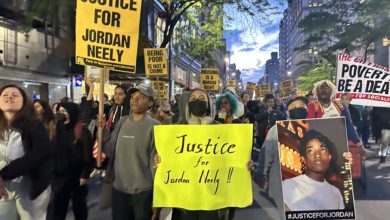Photo: Georgia State Capitol. Credit — Ken Lund (Flickr)
A sweeping attack on voting rights, SB 202, signed into law by Georgia Governor Brian Kemp last week, is causing outrage across the country. It is the latest in the series of voter disenfranchisement efforts in the state in the tradition of Jim Crow segregation, which denied the most fundamental rights to Black Georgians. Protests have taken place throughout the state and now major companies and institutions have begun responding to the pressure. Major League Baseball, for instance, announced that this year’s All-Star Game and the league’s draft would no longer be held in the state.
SB 202 introduced a wide range of measures making it more difficult to vote. Voters can request absentee ballots only 11 weeks before elections unlike the previous window of 26 weeks, and will face stricter ID requirements as well. Now, voters will need to provide their personal information, address and ID number for their vote to be counted.
Additionally, mobile voting centers to expand voting access are basically banned. Going to a location other than the voter’s precinct can disqualify votes. SB 202 also criminalizes offering food and water to voters in line as a misdemeanor.
While these impediments may not be daunting to wealthier voters with more free time and access to information, for workers struggling to survive any additional obstacle could be the last straw. Unable to legally write laws that explicitly discriminate on the basis of race, Georgia’s political elites understand full well the effect SB 202 will have given substantially higher rates of poverty among Black voters and voters from other oppressed communities. Many poor white Georgians will also be disenfranchised.
Previously, counties in Georgia administered elections. SB 202 consolidated these powers to the State Election Board, which can now intervene in county offices and install a temporary superintendent to oversee hiring or firing of election personnel. Right-wing reactionaries have traditionally held power at the state level in Georgia.
One of the most shocking episodes in the run up to the bill’s passage — and one that so clearly illustrates the racist character of the state government — came on March 25. Georgia State Representative Park Cannon was illegally arrested simply for knocking on Gov. Kemp’s door as he was signing SB 202 into law!
Cannon, a Black woman, is not the first elected state official to be treated in a racist manner by state authorities despite having a democratic mandate to represent her constituents. For instance, the Georgia House of Representatives voted by an overwhelming 184 to 12 margin in 1966 to deny prominent civil rights and anti-war activist Julian Bond the seat he was elected to in the legislature.
Vicente Contreras, a member of the Party for Socialism in Atlanta who has participated in protests against SB 202, told Liberation, “These laws are an attack on the Black community of Georgia, they’re a part of a very long historical process of the disenfranchisement of the Black community.” He stressed the need to “mobilize against any form of racism.”






